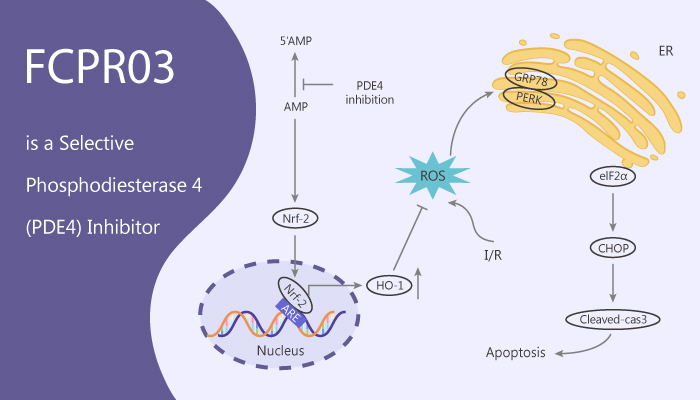Phosphodiesterase 4 (PDE4) is an enzyme mainly expresses in the central nervous system, smooth muscle, cardiovascular. In neuronal cells, PDE4 has a high PDE activity. And these activity associates with multiple neurological and psychiatric disorders. In conclusion, PDE4 plays an important role in the pathology of neuropsychiatric disorders. Additionally, investigations into novel types of PDE4 inhibitors draws increasing attention.
In this article, we will introduce a potent and selective phosphodiesterase 4 (PDE4) inhibitor, FCPR03.

FCPR03 is a potent and selective phosphodiesterase 4 (PDE4) inhibitor with an IC50 value of 60 nM on the core catalytic domains of human PDE4. It also displays at least 2100-fold selectivity over other PDEs (PDE1-3 and PDE5-11).
Firstly, in HT-22 cells, FCPR03 treatment increases cell viability (oxygen-glucose deprivation (OGD)-induced) in a dose-dependent manner. And 10 μM FCPR03 shows significant protective effects.
Additionally, this compound protects against OGD-induced cellular apoptosis in both HT-22 cells and cortical neurons. The levels of mitochondrial membrane potential (MMP) and ROS are also restored by FCPR03.
Furthermore, FCPR03 treatment increases the levels of phosphorylated AKT, glycogen synthase kinase-3β (GSK3β), and β-catenin.
Nextly, in male Sprague-Dawley rats, induced middle cerebral artery occlusion (MCAO) model. FCPR03 treatment reduces the infarct volume and improves neurobehavioral outcomes in rats following MCAO. It increases the levels of phosphorylated AKT, GSK3β, and β-catenin within the ischemic penumbra of rats following cerebral ischemia-reperfusion. this result is consistent with the result in Vivo.
In conclusion, FCPR03 protects neuronal cells against cell apoptosis by OGD in HT-22 cells and primary cultured neurons. Besides, it inhibits the generation of ROS and restores the function of mitochondria in neurons in a rat model of cerebral ischemia-reperfusion, FCPR03 protects against brain injury by reducing infarct volume neurological deficit scores and neuronal degeneration.
As a potent PDE-4 inhibitor, FCPR03 displays anti-inflammatory and neuroprotective effects.
Reference:
[1]. Bingtian Xu, et al. Biochem Pharmacol. 2019 May;163:234-249.
[2]. Zheng-Qiang Zou, et al. J Pharmacol Exp Ther. 2017 Jul;362(1):67-77.